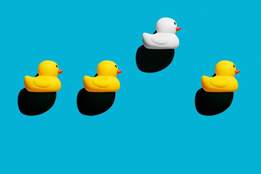You know what it looks like… but what is it called?
TAKE THE QUIZTrending: ‘churlish’
Lookups spiked 3,500% on February 27, 2019
Churlish gave a surly and petulant shrug of its shoulders and stomped to the top of our lookups on February 27th, 2019, after President Trump’s former lawyer used the word in his closing statement to testimony given before a committee of representatives.
Cohen's closing statement on Trump:
— erica orden (@eorden) February 27, 2019
"This behavior is churlish, it denigrates the office of the president and it's un-American."
We provide three definitions for churlish: “of, resembling, or characteristic of a churl,” “marked by a lack of civility or graciousness,” and “difficult to work with, intractable.” Churl also has a range of possible meanings, including (but not limited to) “a medieval peasant,” “a rustic person,” and “a rude, ill-bred person.”
Churlish, and, presumably, the people for whom such a descriptor would be applicable, has been with us for a very long time (before the 12th century). The word comes from the Middle English cherlyssh (“of churls, rustic, uncouth”), which may be traced back further to the Old English word ceorl ("male person, countryman, member of the lowest class of free men”).
Againe consider on the other side that whatsoever other good qualities a man hath, yet if he be of an unkinde and churlish nature he shal never winne the hearts of men, nor ever prevaile in any worthy service, in Church, in common-wealth or family, a sower, cynicall, and churlish behaviour is distastfull to everie one.
— Edward Elton, An exposition of the Epistle of St Paule to the Colossians, 1615
Trend Watch is a data-driven report on words people are looking up at much higher search rates than normal. While most trends can be traced back to the news or popular culture, our focus is on the lookup data rather than the events themselves.








